AI Revolutionizes Holiday Travel: The holiday season is synonymous with record-breaking travel numbers, and this year is no exception. With nearly 80 million travelers hitting the roads and skies, disruptions are inevitable. However, advancements in artificial intelligence (AI) are paving the way for a smoother travel experience, even amidst the chaos.
The Complexity of Travel Logistics: While air travel is generally reliable, managing disruptions at airports presents a different challenge. The intricate logistics of coordinating hundreds of flights across time zones, crew schedules, and connecting flights often outpace human problem-solving capabilities. This is where AI steps in, augmenting human decision-making by processing complex data and delivering actionable insights.
Enhancing Airline Operations: Airlines like Delta are already harnessing the power of AI to predict and mitigate delays. By analyzing factors such as weather conditions and air traffic, AI tools enable proactive schedule adjustments. In 2023, Delta achieved North America’s best on-time performance, with nearly 85% of its flights arriving within 15 minutes of schedule—10% higher than the average.
AI-Powered Tools in Action: AI isn’t just about analyzing data; it’s about transforming it into real-time solutions. For instance, large language models (LLMs) can detect potential delays based on early signals, such as gate agent communications. This information is then used to calculate critical factors, including:
- Routing passengers efficiently between gates.
- Estimating passenger travel times, even accounting for detours like a quick coffee stop.
- Assessing jet bridge readiness based on operator performance history.
- Predicting the ripple effects of delays on crew schedules, passenger connections, and aircraft positioning.
Collaborative AI: A New Era of Travel Management: The strength of AI lies in its ability to work alongside humans. By providing gate crew and operations teams with actionable insights in mere seconds, AI empowers them to make decisions that keep travelers moving. For example, AI can determine whether a five-minute delay might result in an hour-long hold due to weather or air traffic, enabling informed, proactive measures.
Employee Concerns and the Role of AI: Despite its benefits, many employees worry about the impact of AI on their roles. However, AI is designed to complement, not replace, human expertise. By handling complex data, it allows employees to focus on strategic decision-making, ultimately enhancing their roles rather than diminishing them.
Building a Resilient Travel Future: The integration of AI into airline operations marks a shift from reactive problem-solving to proactive management. This holiday season, while challenges remain, the progress made with AI-enabled tools signals a brighter, more resilient future for the travel industry.
Related Insight: For a broader look at AI’s transformative potential across industries, explore How AI Shaped Elections in 2024: Surprises and Lessons Learned.







